
Motion Sensors - Accelerometers
Motion Sensors - Accelerometers: Precision in Motion Detection
Definition:
Motion Sensors - Accelerometers are specialized devices designed to measure acceleration forces, including static (gravity) and dynamic (movement or vibration) forces. These sensors are essential for detecting and analyzing motion in various applications, from consumer electronics to industrial systems. By converting mechanical motion into an electrical signal, accelerometers provide critical data for orientation, tilt, shock, and vibration detection.
Types of Motion Sensors - Accelerometers:
1. MEMS (Micro-Electro-Mechanical Systems) Accelerometers: Compact, low-power sensors widely used in smartphones, wearables, and IoT devices for motion tracking and gesture recognition.
2. Piezoelectric Accelerometers: Ideal for high-frequency vibration monitoring in industrial machinery, automotive testing, and aerospace applications.
3. Capacitive Accelerometers: Known for high accuracy and stability, commonly used in navigation systems, robotics, and medical devices.
4. Piezoresistive Accelerometers: Robust sensors capable of measuring high-impact forces, often applied in automotive crash testing and structural health monitoring.
Buying Recommendations:
When selecting an accelerometer, consider the following factors:
- Measurement Range: Choose a sensor that matches the expected acceleration levels (e.g., 2g for consumer devices vs. 500g for industrial impacts).
- Bandwidth: Ensure the sensor s frequency response aligns with your application (e.g., low-frequency for tilt sensing vs. high-frequency for vibration analysis).
- Output Type: Analog, digital (I2C/SPI), or wireless outputs should suit your system s integration requirements.
- Environmental Durability: For harsh environments, opt for models with robust enclosures and resistance to temperature, humidity, or shock.
Motion Sensors - Accelerometers are pivotal in enabling smart, responsive systems. Whether for innovation in consumer tech or precision in industrial automation, selecting the right accelerometer ensures optimal performance and reliability.
Filter and sort
Categories
BMA400
ACCELEROMETER 2-16G 12LGA
AD22284-A
ACCELEROMETER 35G ANALOG 8CLCC
MMA1618KW
DSI2.5 ACCELEROMETER, 12V, Z, 18
787B
ACCEL IEPE SENSOR
780A-IS
ACCEL SENSOR
820M1-0100
ACCELEROMETER
SCA3100-D04-10
ACCELEROMETER 2G SPI 12SMD
KXCJ9-1008-FR
ACCELEROMETER 2-8G I2C 10LGA
LIS2DTW12TR
MEMS DIGITAL OUTPUT DUAL MOTION
SCA3100-D04-1
ACCELEROMETER 2G SPI 12SMD
MMA6262QR2-FR
PLUS/MINUS 1.5G DUAL AXIS MICROM
ADW22035Z
IC ACCELEROMETER SINGLE 8CLCC
312A-10-LF
LIGHTNING PROTECTIVE LOW FREQUEN
MXR2999EL
ACCELEROMETER 0.5G ANALOG 8QFN
MIS2DHTR
ACCEL 2-16G I2C/SPI 12LGA
ADXL327BCPZ-RL
ACCELEROMETER 2G ANALOG 16LFCSP
786LF-250
ACCEL IEPE SENSOR
CMCP1100C
LOW COST ACCEL W/M8 3-PIN
MMA5224AKWR2
XTRINSIC, PSI5 INTERTIAL SENSOR
ADXL1001BCPZ
ACCELEROMETER ANALOG 32LFCSP




















